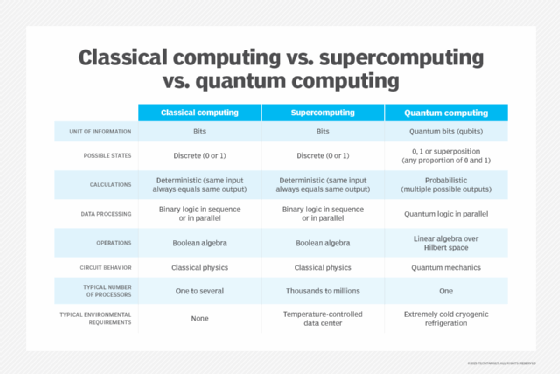What is quantum as a service? Definition and top providers
Quantum as a service (QaaS), or quantum computing as a service, is a cloud-based way for organizations to access quantum computing technologies and capabilities more affordably through a third-party provider.
Quantum computing is still in the early phases of the maturity cycle, so it isn't accessible to most organizations. From a hardware and software perspective, it often requires specialized expertise and is prohibitively expensive to develop and maintain in-house.
QaaS can lower these barriers with cloud-based offerings that let organizations use quantum computational resources on a subscription or pay-as-you-go (PAYG) basis to test experiments, run algorithms and conduct research. This reduces the need for in-depth quantum knowledge.
How does quantum as a service work?
Like other as-a-service models, such as software as a service and platform as a service, QaaS relies on virtualization to host and deliver quantum resources through a cloud environment. Those resources can differ by provider, but they might include physical quantum computer hardware, emulated quantum processing units, quantum software applications, quantum development environments, prebuilt quantum algorithms, quantum infrastructure and other quantum tools, technologies and services.
Since these resources are cloud-based, organizations can access them remotely to perform various tasks. For example, users could design an algorithm by accessing a virtualized quantum development environment on their local desktop. They could then remotely test the algorithm on the provider's quantum computer.
QaaS pricing options differ depending on the provider. Some require an ongoing subscription plan to access quantum workspaces. On-demand or per-task pricing is also common, so users only pay for what they use. Another option is to reserve dedicated access to quantum resources instead of waiting for the provider to complete jobs by priority.
This model gives organizations more granular control over pricing and saves users from needing dedicated hardware, software and infrastructure to support quantum workloads. Some providers also offer various services that organizations can lean on to guide algorithm coding and development, including access to quantum scientists who can provide advice on experiments and research projects.
Benefits of quantum as a service
QaaS offers organizations the following benefits they might want to explore:
- Flexible cost management. Quantum computing is prohibitively expensive to develop and run internally. QaaS significantly reduces the steep upfront investment required to get involved with quantum. The PAYG model helps organizations get a better handle on how much they spend. This flexibility lowers the barrier to entry for early adopters who want to experiment with the technology affordably.
- Enhanced computational capabilities. Much of the appeal of quantum computing is its ability to perform complex computations significantly faster than classical computers. By democratizing quantum, QaaS enables organizations of all sizes to gain access to these capabilities, which can support everything from accelerated R&D to rapid experimentation, prototyping and beyond.
- Scalability and accessibility. QaaS platforms empower users to use only the quantum resources they need. Organizations can start with simple simulations and ramp up to more complex computations. Since QaaS is cloud-based, users can access needed resources from anywhere in the world, enabling organizations to dynamically scale without worrying about physical limitations.
- Simplified integration. With QaaS, there's no need to install or configure any hardware. Working with virtualized systems can also make integrating with other resources, such as classical computers or cloud-based tools, easier. Organizations don't need to have specialized expertise to integrate quantum capabilities into existing infrastructure, simplifying the process of setting up workflows across systems.
- Access to cutting-edge technology. Quantum computing continues to break new ground by developing more powerful and accurate quantum technologies. QaaS customers can take advantage of these advancements as soon as they're added to the service, enabling them to stay on the cutting edge of innovation without upgrading equipment themselves.

Challenges of quantum as a service
QaaS offers a variety of advantages, but some potential roadblocks include the following:
- Resource availability. Even though QaaS aims to scale quantum resources, there's only so much bandwidth to go around because the hardware is so difficult to build and maintain. As such, many QaaS providers use a scheduling system to determine when jobs will run. This helps allocate resources to ensure no one monopolizes hardware, but the tradeoff is that jobs might not get done as soon as desired.
- Limited capabilities. In a subscription QaaS model, certain capabilities might be locked behind more expensive subscription tiers. Even with a PAYG model, there might be a lack of freedom to experiment due to thresholds that limit the scale of computations. In addition, not every QaaS offering is comprehensive; some offer full development suites, while others only run predeveloped algorithms.
- High operational costs. QaaS offerings with a PAYG model might reduce the upfront investment organizations must make to use quantum technologies, but costs can quickly balloon. Providers typically charge for jobs based on the time required to complete them, so the larger the project, the higher the price. More tasks mean more expenses, so balancing costs with use is important.
- Skills gap. Despite lowering the barriers to entry for quantum, QaaS platforms, software and developer toolkits might still require a certain level of technical skill. For example, building a quantum algorithm isn't the same as designing an algorithm that can be run on supercomputers or classical computers. Before jumping into a QaaS offering, this potential skills gap should be noted to ensure usability.
- Interoperability. Because the field is rapidly evolving, there's a lack of standardization across QaaS offerings. An interface and toolkit from one provider will likely look and work differently than one from another, and deployment strategies can also vary widely. As a result, seamless integration can't be guaranteed; if an organization wants to switch to another QaaS, it might require reintegrating and relearning a new platform.
6 quantum-as-a-service offerings
Quantum as a service can help lower the barrier of entry to quantum capabilities for organizations that want to be early adopters but don't want to break the bank.
As the sector grows, more organizations offer QaaS products, each with unique characteristics. The following are some of the top offerings on the market, listed in alphabetical order.
Amazon Braket
Amazon Braket is a fully managed quantum computing service that provides everything needed to build, test and run quantum algorithms on AWS. This includes on-demand or dedicated access to quantum hardware and various simulation and developer tools.
Azure Quantum
Azure Quantum is a full-stack cloud quantum computing service that provides a range of quantum hardware, software and services. This includes running quantum programs, simulating algorithms and estimating the resources needed to run programs on quantum machines.
D-Wave Leap
The Leap quantum cloud service delivers 99.9% uptime and availability to the world's largest quantum computers. The platform also provides a suite of hybrid solvers that accept industry-scale problems and a LaunchPad program to help organizations get started.
IBM Quantum Platform
The IBM Quantum Platform provides access to quantum computers, documentation and learning resources using Qiskit, which provides software to create quantum programming models. A new version of the platform is being developed to introduce more robust services.
IonQ Quantum Cloud
The IonQ Quantum Cloud platform is a full quantum development stack that's compatible with all major quantum software development kits (SDKs). It also provides access to all of IonQ's quantum processing units.
Rigetti Quantum Cloud Services
The QCS platform is a hybrid quantum-classical system that enables organizations to connect high-performance classical hardware with Rigetti's quantum processing units through network application programming interfaces. The platform also provides SDKs and instruction language support.







